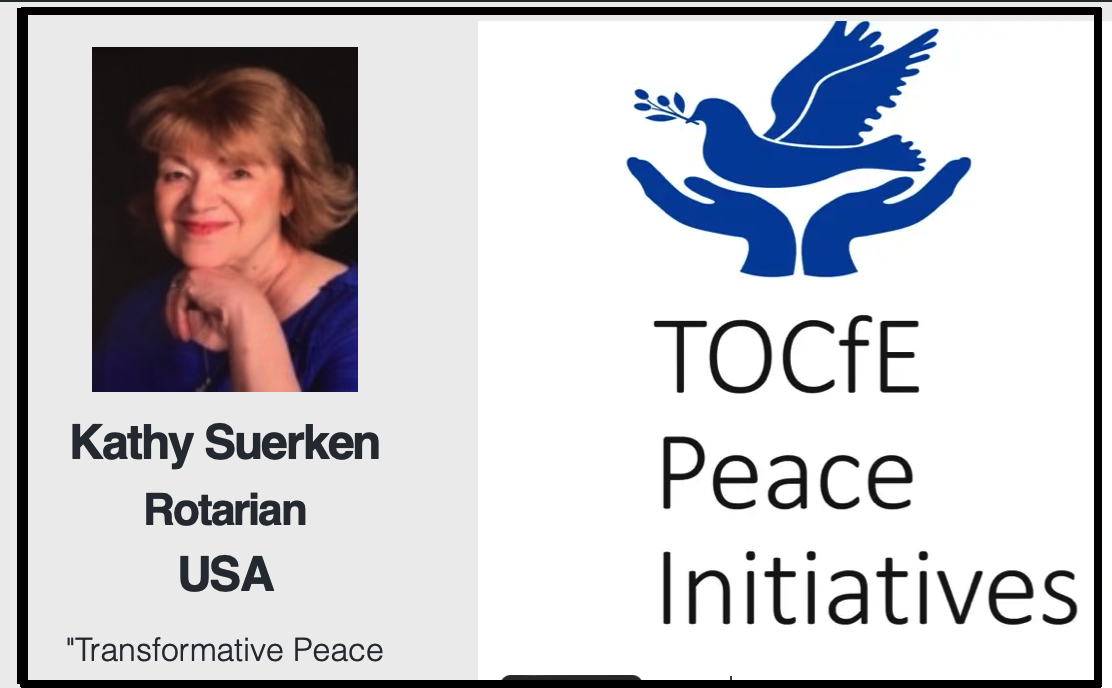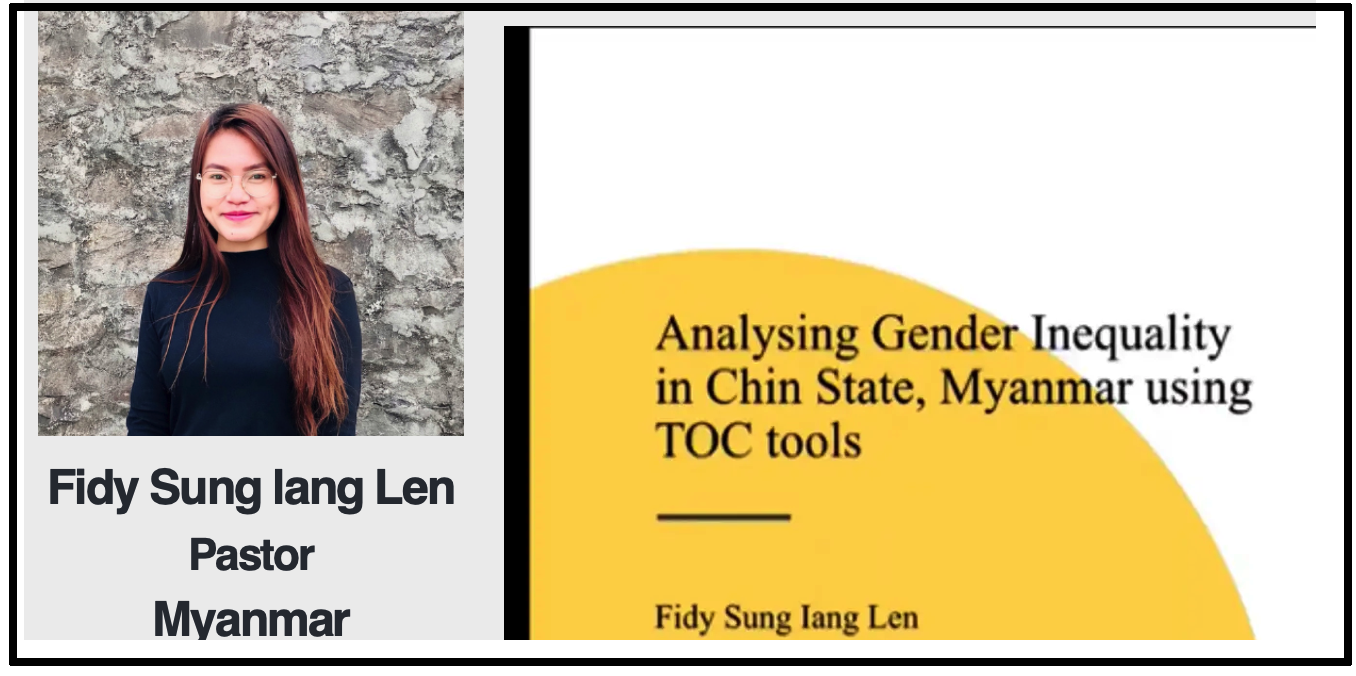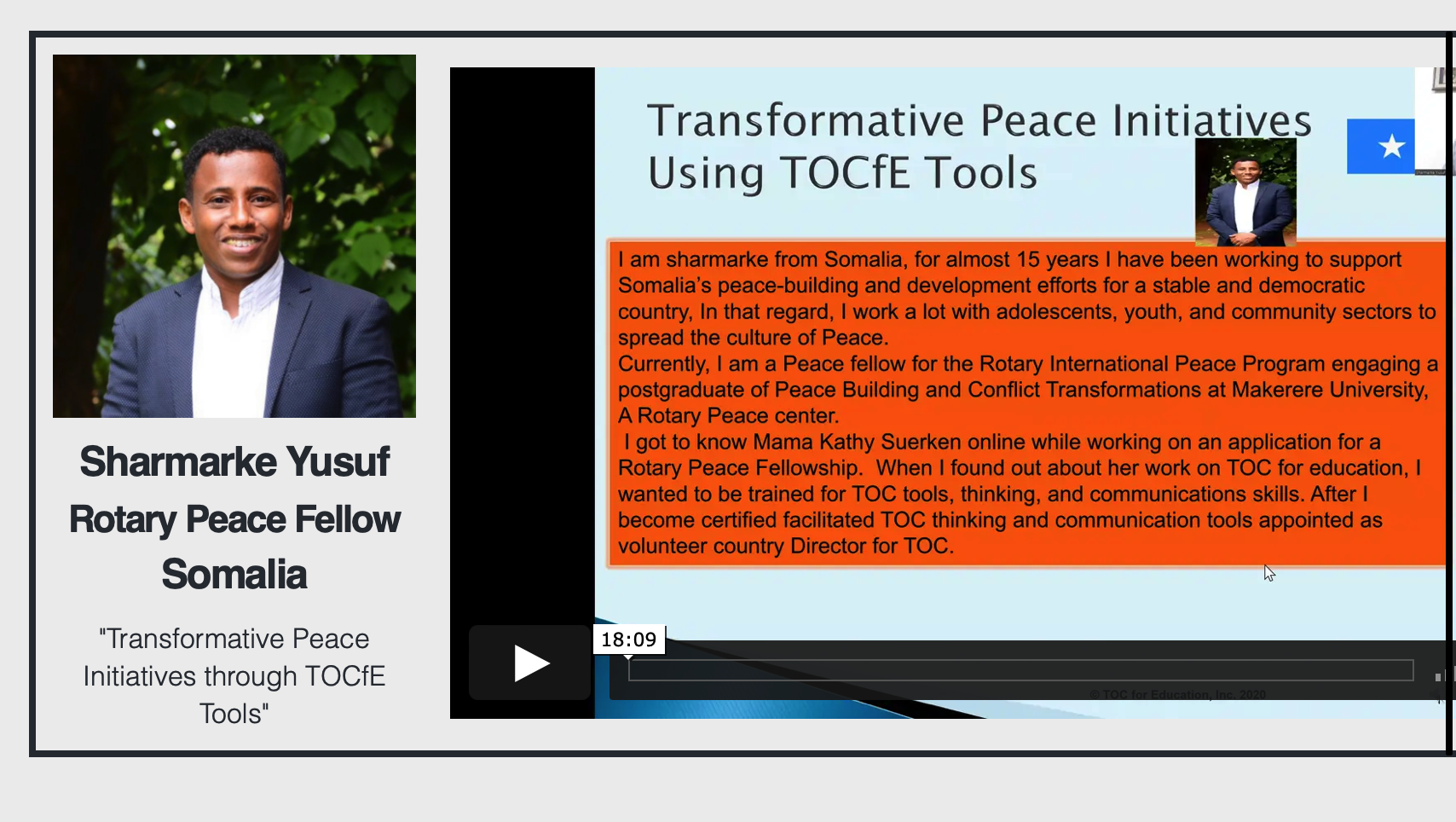… EDUCATION FOR PEACE …
Special to CPNN from Nancy Oley
Community leaders from the United States, Singapore, Myanmar and Somalia reported on their ongoing peace projects in a session entitled “Transformative Peace Initiatives through TOCfE Tools” at the virtual TOCfE International Symposium on February 26, 2022. Presentations of the four speakers are summarized below.

Kathy Suerken is a Rotarian, President of Theory of Constraints for Education, Inc. (TOCfE) and organizer of the TOCfE International Symposium. Founded by the late Israeli physicist Eliyahu Goldratt, TOCfE is dedicated to the application of the Theory of Constraints (TOC) to education. Suerken argues that peace is not a zero-sum game in which “I win, and you lose;” it is a process. The tools and strategies of TOC are the means by which we develop a “win-win” mindset and find “win-win” solutions to conflicts, assuring that no one is harmed. Even young children have used the simple TOC thinking and communication tools to resolve conflicts and become peacemakers on the playground and in their classrooms. TOCfE is currently active in 23 countries and six continents.
The Rotary Peace Fellowship Program is a program designed for community leaders who have experience in and are committed to international peace and development. Fellows are offered financial support and are trained at international Rotary Peace Centers to carry out projects promoting peace around the world as they pursue a master’s degree or Professional Development Certificate. There are currently 1,300 Fellows working in 115 countries. Fellowships are awarded through local Rotary Clubs.
Two Peace fellows whose work is described below are using the graphical tools of TOC to prevent and resolve conflicts (win-win solutions), to logically analyze cause-effect relationships, to analyze and sequence the steps needed to achieve a goal, and to create systemic change.

Christina Cheng, Singapore Director of TOC for Education and a Rotary Peace Fellow, noted that the cost of conflict and violence is 10% of the world’s GDP or about $5 per person. Given that 9% of the world lives on less than $1.90 per day, a 3% reduction in conflict spending could fund the entire global food aid fund. Countries that ranked high on the 2021 Global Peace Index based on their safety and security, domestic and international conflict, and militarization, also ranked high on the World Happiness Report (2021) that measures life evaluations, as well as positive and negative emotions. Happiness is correlated with a sense of security, and security is correlated with physical peace. However, countries ranking high on happiness are also among the highest users of anti-depressants, suggesting that the absence of physical conflict/ war or “negative peace” is not sufficient. For a society to have “positive peace” – to be free from stress, anxiety, depression, and unresolved personal conflicts – mindsets, attitudes, systems and structures must be changed. Studies show that training in the areas of conflict resolution and problem-solving can reduce the incidence of depression in youth. So why, then, is so little time and money spent on teaching these skills in school? TOCfE provides the tools for people of all ages, races, religions, genders and cultures to analyze problems and to resolve conflicts logically without blame or anger, producing more harmonious and peaceful individuals, families and communities.
In this regard, an important application of TOC tools has been with repeat offenders. TOCfE training helps inmates recognize their negative thinking patterns by identifying the root cause of their behavior and uncovering mistaken assumptions that have led them into a downward spiral. Simple TOC peace tools have also been taught to men and women in halfway houses, military prisons, and drug rehabilitation centers.
.
(Article continued in right column)
Mediation as a tool for nonviolence and culture of peace
(Article continued from left column)

Pastor Fidy Sung lang Len is Head of the Women’s Department and Christian Education Department of the Olive Baptist Church, a Committee Member in the Hakha Baptist Association (HBA) Women’s Division, a Committee Member in the HBA CE Department, and a Committee Member in the Cultural Department of Chin Association for Christian Communication. Collectively, these groups touch roughly 35, 000 women/girls and 15, 000 children from the Hakha Chin community. According to Len, the Chin people are the smallest, poorest, and least educated minority group in war-torn Myanmar, with gender inequality, violence and abuse deeply rooted in their culture and identity.
Len has used TOC thinking process tools to help empower Chin women, despite the cultural, religious, and political obstacles to doing so. The cloud tool was used to resolve conflicts. In Len’s work there is a conflict between the desire/want to speak out against gender inequality and the desire/want to not speak out. Each of these alternative “wants” is necessary to fulfill its associated “need”— to help others and improve the situation on the one hand, and to avoid further conflict and unhappiness on the other. The overarching goal, to have a happy and satisfying life, can be achieved by fulfilling both needs. By logically examining the assumptions underlying the suggested causal connections between wants and needs, one can find ways to satisfy the needs and provide a “win-win” solution to the conflict. Len’s analysis suggested a number of steps to be taken, among them: partner with international non-governmental organizations with knowledge of how to reduce gender inequality, work for equal education, introduce concepts of gender equity into the early curriculum, work with church leaders to correct misunderstanding of biblical teachings about gender, always include men’s voices in the discussion, speak to men with respect and sensitivity to their fears, work with respected male leaders to champion women’s equity, and emphasize that gender equity benefits both women and men.

Sharmarke Yusuf, Rotary Peace Fellow, Certified TOC Facilitator and TOC Country Director, noted that Somalia’s two-decades long armed conflict and civil war has had a psychological impact on the population, and that to be successful, any educational approach must promote inclusivity, peace, respect, non-violence and avoid blaming others. Toward this end, local teachers learned TOC critical thinking and communication tools to empower youth with coping and decision-making skills, self-understanding, and the psychological support they need to resist being manipulated by others.
As one example, Yusuf noted that early marriage prevents young Somalis, especially women, from attaining their educational goals. Using the graphical TOC cloud tool, a young couple came to understand their common goal (a happy family together), what each person needed (not to lose the relationship/continue in school), and how their wants conflicted (marry now vs. not marry now). By critically examining the assumptions underlying their conflict, they came to recognize that their common goal would be easily met if they both continued their education, a “win-win” solution.
Yusuf also outlined his efforts to prevent the radicalization of incarcerated youth using TOC tools to change the systemic factors contributing to incarceration and destructive post-release behaviors. He analyzed “what to change,” “what to change to,” and “how to cause the change.” His ongoing study includes 10 female and 10 male youth 18-32 who are school dropouts, unemployed and/or involved in conflict—- a population very vulnerable to being used for fueling conflicts, radicalization and extremist violence. The goal of the project is to engage and empower the participants to be a positive force for transformation and peace through: training in TOC communication, thinking and conflict resolution tools; “positive peace” education; employment skill building; and community volunteer activities. The number of young people participating in the interventions and their attitudes before and after the interventions are being measured. At the end of the study, he will assess participants’ integration into their community, their ability to think critically, and their success at making changes in their lives, i.e., to be agents of peace and productive community members.
(Comments on this topic may be sent to ![]() . Please indicate if you wish them to be published with this article and/or forwarded to its author.)
. Please indicate if you wish them to be published with this article and/or forwarded to its author.)